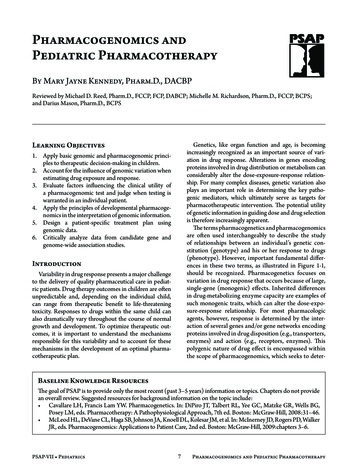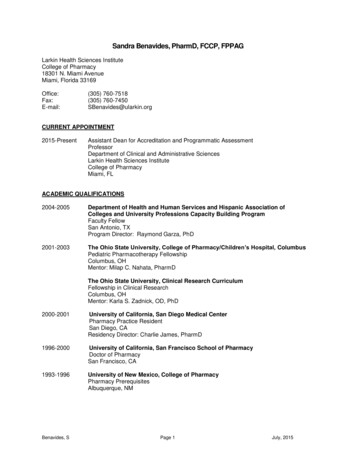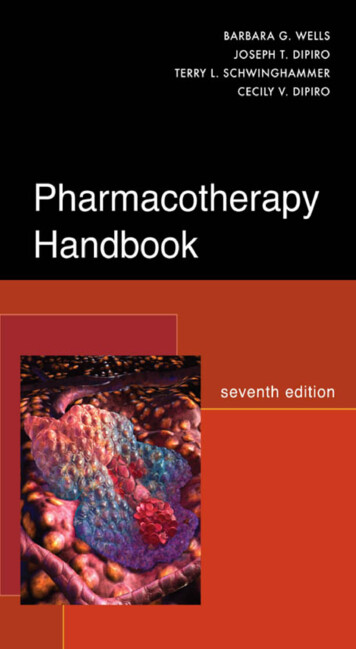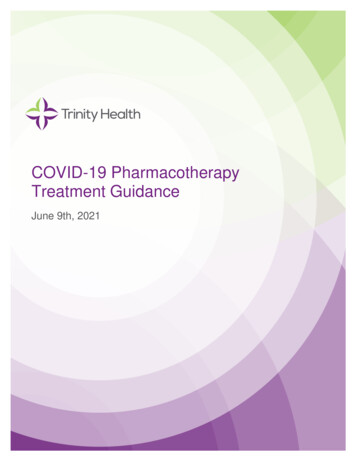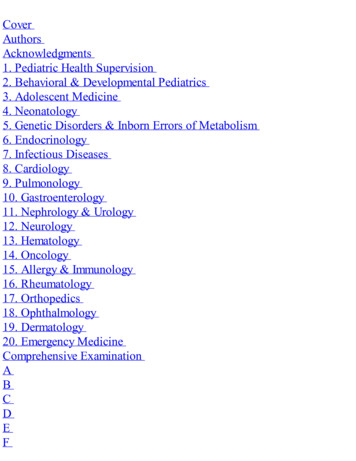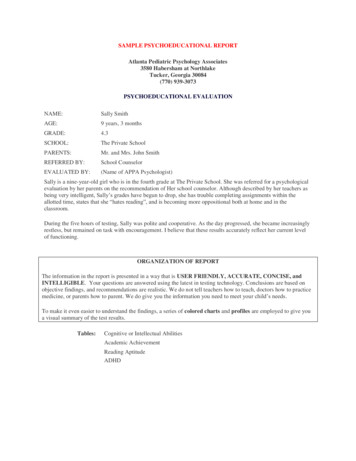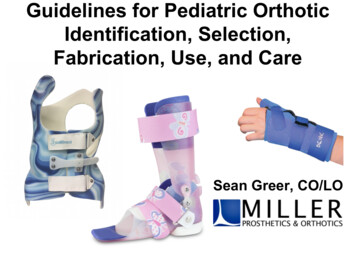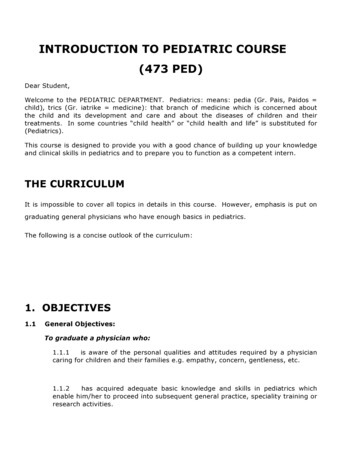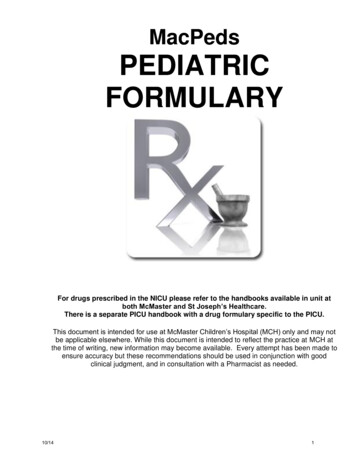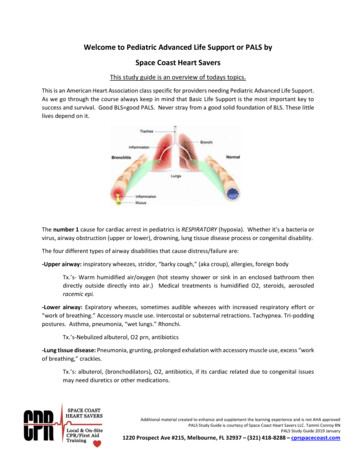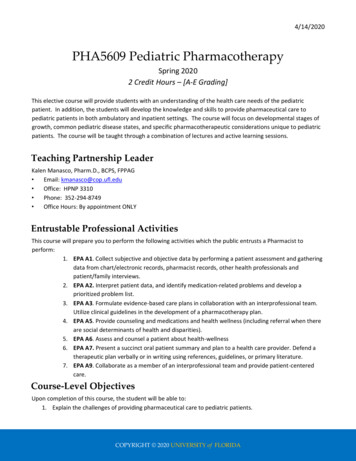
Transcription
4/14/2020PHA5609 Pediatric PharmacotherapySpring 20202 Credit Hours – [A-E Grading]This elective course will provide students with an understanding of the health care needs of the pediatricpatient. In addition, the students will develop the knowledge and skills to provide pharmaceutical care topediatric patients in both ambulatory and inpatient settings. The course will focus on developmental stages ofgrowth, common pediatric disease states, and specific pharmacotherapeutic considerations unique to pediatricpatients. The course will be taught through a combination of lectures and active learning sessions.Teaching Partnership LeaderKalen Manasco, Pharm.D., BCPS, FPPAG Email: kmanasco@cop.ufl.edu Office: HPNP 3310 Phone: 352-294-8749 Office Hours: By appointment ONLYEntrustable Professional ActivitiesThis course will prepare you to perform the following activities which the public entrusts a Pharmacist toperform:1. EPA A1. Collect subjective and objective data by performing a patient assessment and gatheringdata from chart/electronic records, pharmacist records, other health professionals andpatient/family interviews.2. EPA A2. Interpret patient data, and identify medication-related problems and develop aprioritized problem list.3. EPA A3. Formulate evidence-based care plans in collaboration with an interprofessional team.Utilize clinical guidelines in the development of a pharmacotherapy plan.4. EPA A5. Provide counseling and medications and health wellness (including referral when thereare social determinants of health and disparities).5. EPA A6. Assess and counsel a patient about health-wellness6. EPA A7. Present a succinct oral patient summary and plan to a health care provider. Defend atherapeutic plan verbally or in writing using references, guidelines, or primary literature.7. EPA A9. Collaborate as a member of an interprofessional team and provide patient-centeredcare.Course-Level ObjectivesUpon completion of this course, the student will be able to:1. Explain the challenges of providing pharmaceutical care to pediatric patients.COPYRIGHT 2020 UNIVERSITY of FLORIDA
4/14/20202. Identify and utilize appropriate drug information resources to help make decisions about themanagement of common pediatric disease states.3. Recommend appropriate therapy and monitoring of common pediatric disease states (to includeappropriate patient counseling techniques about medications) through participation in patient casediscussions.4. Calculate pediatric dosages of medications and provide information on the availability of dosage forms(i.e., manufactured product, extemporaneous formulation).5. Identify controversial topics relating to the pharmaceutical care of pediatric patients for groupdiscussions.Course Pre-requisites1. Completion of all Year 1 and 2 Pharm.D. program coursework including milestones.2. Satisfactory completion of Blocks 8.Course Co-requisitesCourse OutlinePlease routinely check your campus calendar and the Canvas course site for any messages about changes in theschedule including meeting dates/times, deadlines, and room changes.FacultyAuthorContactHours[hr.]aModule 1: Introduction toPediatricsManasco3.5Introduction to Pediatrics- 30 minute RecommendedViewing Days Mod# Unit TopicWeek 1Wednesday 4/221Wednesday 4/22Careers in Pediatric Pharmacy- 30 minute recordedlectureWednesday 4/22Module 1 QuizWednesday 4/224:15 – 6:05In-class Active LearningSession 1Wednesday 4/22Group ProjectLearningObjectivesCovered1,2,41,2COPYRIGHT 2020 UNIVERSITY of FLORIDA1.5
4/14/2020Week 12Module 2: Principles inPediatric PharmacyCampbell3.5Thursday 4/23Fluids/Electrolytes/Nutrition- 1 hour recorded lectures3,4Campbell1.0Thursday 4/23Medication Safety/DrugInformation- 30 minute recordedlecture1,2Campbell0.5Thursday 4/23Module 2 QuizThursday 4/232:15-4:05In-class Active LearningSession 2Thursday 4/23Group Project3Week 1Friday 4/24Friday 4/24O’Mara1.0PICU Basics and Controversies- 1 hour recorded lecture1,3,5Campbell1.0Active Learning Session 3CampbellGroup Project45.01,3,5Friday 4/244:15-6:05Tuesday, 4/28CampbellNICU Basics and Controversies- 1 hour recorded lectureModule 3 QuizFriday 4/241.01.0Module 3: Pediatric AcuteCareFriday 4/24Week 2Campbell2.01.0Module 4: PediatricAmbulatory CareCampbell6.0Sickle Cell Disease- 1 hour recordedlectureCampbell1.01,2Tuesday, 4/28Diabetes in Pediatrics3- 1 hour recorded lectureGeorge1.0Tuesday, 4/28Pediatric Oncology Principles3- 1 hour recorded lectureHiggins1.0COPYRIGHT 2020 UNIVERSITY of FLORIDA
4/14/2020Tuesday, 4/28Module 4 QuizTuesday, 4/284:15-6:05Active Learning Session 4Tuesday, 4/28Group Project2.01.0Module 5: Special PopulationsManasco4.5Thursday, 4/30Cystic Fibrosis3- 1 hour recorded lectureManasco1.0Thursday, 4/30Renal Disorders- 0.5 hour recordedlectureCampbell0.5Thursday, 4/30Toxicology3- 1 hour recorded lectureManasco1.0Tuesday, 4/30Module 5 QuizThursday 4/304:15 – 6:05Active Learning Session 5CampbellManasco2.0Module 6: GroupPresentationsManasco2.0Week 25CampbellCampbell6Week 2-3Monday, 5/44:15-6:05Thursday May 7TBA1–51,2Group Project Presentations2.0Final Exam2.0Required Textbooks/ReadingsDipiro J, Talbert R, Yee G, Matzke G, Wells B, Posey L. Pharmacotherapy – A pathophysiologic approach.McGraw-Hill Professional, New York, NY, 9th Edition, 2014. ISBN-13:978-0071800532; ISBN-10:0071800530(Available in Access Pharmacy) Use UF VPN to access UF Libraries Resources when off-campus.The UF HSC library staff can assist you with questions or issues related to accessing online librarymaterials. For assistance contact your College of Pharmacy librarian or visit the HSC Library Website atthis URL: http://www.library.health.ufl.edu/COPYRIGHT 2020 UNIVERSITY of FLORIDA
4/14/2020Suggested Textbooks/ReadingsBenavides S, Nahata MC, eds. Pediatric Pharmacotherapy. 1st edition. Lenexa, Kansas: American College ofClinical Pharmacy; 2013. ISBN-13: 978-1-932658-89-7. Available for purchase online:https://www.accp.com/store/product.aspx?pc TH 01PPGKliegman R, Stanton B, St. Geme J, Schor N. Nelson Textbook of Pediatrics. Elsevier Health Sciences, Philadelphia,PA, 20th edition, 2015. ISBN-13: 978-1455775668. Available via HSC library website at this URL:http://www.library.health.ufl.edu/Other Required Learning ResourcesNoneMaterials & Supplies FeesUF Fee that is in addition to tuition: NoneGroup PresentationStudents will be placed into groups on the first day of class and be required to make a brief presentation at theend of the semester on a unique pediatric disease state. The presentation should be in both oral and writtenformat for assessment. You should include background on the disease state and also evidence-basedinformation about the treatment (review of clinical practice guidelines, clinical trials, etc.). The following rubricwill be used to assess the presentation skills of the members of the group. Each member of the group will beexpected to contribute to both the written and oral presentation.Exemplary 10OrganizationSubject KnowledgeAccomplished 7Developing 5Beginning 3Information presented Information in logicalin logical, interestingsequence, is accuratesequence,and comprehensiveis accurate and verycomprehensiveDifficult to followpresentation--studentjumps around ormaterial; is either notaccurate or notcomprehensiveCannot understandpresentation; contentis not accurate andnot comprehensiveDemonstrates fullknowledge byanswering all classquestions withexplanations andelaborationsUncomfortable withinformation and isable to answer onlyrudimentary questionsDoes not have a graspof the information.Cannot answerquestions aboutsubjectAt ease with expectedanswers to questionsbut does notelaborateCOPYRIGHT 2020 UNIVERSITY of FLORIDA
4/14/2020GraphicsExplain and reinforcescreen text andpresentation,information is insufficient detail butnot overwhelmingRelate to text andpresentation, lackssufficient detail oroverwhelming amountof detailOccasionally usesgraphics that rarelysupport text andpresentationUses superfluousgraphics or nographicsResearchUses a variety ofsources in reachingaccurate conclusions(at least 5 sources thatare primary,secondary, or tertiarysources.) All sourcesare properly citedUses a variety ofsources in reachingconclusions (does notuse 5 sources or doesnot use a variety ofsources that areprimary, secondary, ortertiary in nature)Presents onlyevidence thatsupports apreconceived point ofview(uses l or 2 sources orcitations areincompleteDoes not justifyconclusions withresearch evidence (nosources cited)Maintains eye contactmost of the time andpronounces mostwords correctly.Most audiencemembers can hearpresentationOccasionally uses eyecontact, mostlyreading presentation,and incorrectlypronounces terms.Audience membershave difficulty hearingReads with no eyecontact andincorrectlypronounces terms.Speaks too quietlyusing an approvedformat.Oral PresentationElocution/EyeContactMaintains eye contactand pronounces allterms precisely. Allaudience memberscan hear.Total PointsDeveloped by Kay Sagmller, Director Center for Teaching and Learning Oregon State UniversityStudent Evaluation & GradingEvaluation Methods and How Grades are calculatedAssessment ItemGrade PercentagePost lecture/pre-class quizzes (n 5)25%Group presentation35%Final Exam20%Active Learning Sessions/Group Discussion20%Total100%COPYRIGHT 2020 UNIVERSITY of FLORIDA
4/14/2020Table 1. Grading ScalePercentage RangeLetter Grade92.50-100%A89.50-92.49%A-86.50-89.49%B 82.50-86.49%B79.50-82.49%B-76.50-79.49%C 72.50-76.49%C69.50-72.49%C-Educational Technology Use66.50-69.49%D 62.50-66.49%D59.50-62.49%D- 59.50%EThe following technology below will be used during the course and thestudent must have the appropriate technology and software.1.ExamSoft Testing Platform2.Canvas Learning Management SystemFor technical support, navigate to Educational Technology and IT SupportContact Information at this dents/technical-help/Rounding of grades:Final grades in Canvas will be rounded to the 2nd decimal place. If thedecimal is X.495 or higher, Canvas will round the grade to X.50. Theabove scale depicts this policy and grades are determined accordingly.Grade assignment is made using this policy and NOEXCEPTIONS will be made in situations where a student’s grade is“close.”Pharm.D. Course PoliciesThe Pharm.D. Course Policies in the following link apply to this students/course-policies/Please review these policies carefully before the course starts.COPYRIGHT 2020 UNIVERSITY of FLORIDA
4/14/2020Appendix A. Course DirectoryTeaching Partnership Leader/Course Director:Kalen Manasco, PharmDEmail: kmanasco@cop.ufl.eduOffice Hours: By appointment ONLY.Questions to Ask: Questions about gradesConcerns about performanceGuidance when there are performance problems (failing grades)General questions about contentInstructional Designer:Instructional Designer:Name: Elliot TordoffEmail: etordoff@cop.ufl.eduOffice: HPNP 4309Academic Coordinator:Name: Misti. MerrillEmail: absent2pd@cop.ufl.edu or absent3pd@cop.ufl.eduOffice: HPNP 4312Phone: 352-273-5617Office Hours: By appointment ONLY.Questions to Ask: Issues related to course policies (absences, make up exams, missed attendance)Absence requests (Only the Academic Coordinator handles absence requests)Questions about dates, deadlines, meeting placeAvailability of handouts and other course materialsAssignment directionsQuestions about grade entries gradebook (missing grades, wrong grade)Assistance with ExamSoft (Distant campus students may contact Education Coordinator for use ofSofTest and assistance during exams. The Academic Coordinator is the contact person for issues relatedto grading and posting of ExamSoft grades.)COPYRIGHT 2020 UNIVERSITY of FLORIDA
4/14/2020Educational CoordinatorsName: McKenzie WallenEmail: mwallen@cop.ufl.eduOffice: Jacksonville CampusName: Iverta AllenEmail: iallen1@cop.ufl.eduOffice: Orlando CampusOther Teaching Partnership Faculty Members:Campbell, ChristopherEmail: campbellc@cop.ufl.eduOffice: HPNP 2314APhone: (352) 294-8779Campbell, CourtneyEmail: cter0002@shands.ufl.eduKelly, BrianEmail: kellbj@shands.ufl.eduFrame, VictoriaEmail: vfra0001@shands.ufl.eduGeorge, AlexEmail: ageo0002@shands.ufl.eduCOPYRIGHT 2020 UNIVERSITY of FLORIDA
PHA5609 Pediatric Pharmacotherapy Spring 2020 2 Credit Hours – [A-E Grading] This elective course will provide students with an understanding of the health care needs of the pediatric patient. In addition, the students will develop the knowledge and skills to provide pharmaceutical care to pediatric patients in both ambulatory and inpatient settings. The course will focus on developmental .
